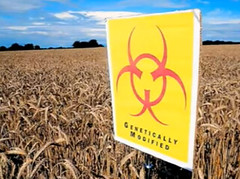Increase your income and your yields with traditional farming methods? That’s what’s happening in India.
Nishika Patel blogged 11 May 2011 in The Guardian, Organic farming – India’s future perfect?
How did this happen?India’s struggling farmers are starting to profit from a budding interest in organic living. Not only are the incomes of organic farmers soaring – by 30% to 200%, according to organic experts – but their yields are rising as the pesticide-poisoned land is repaired through natural farming methods.
Organic farming only took off in the country about seven years ago. Farmers are turning back to traditional farming methods for a number of reasons.Continue readingFirst, there’s a 10% to 20% premium






 Some people didn’t like the source of a recent post about
the toxic effects of agrochemicals and GM plants on the environment,
plants, animals, and people.
There are plenty of other sources, including:
Some people didn’t like the source of a recent post about
the toxic effects of agrochemicals and GM plants on the environment,
plants, animals, and people.
There are plenty of other sources, including:

